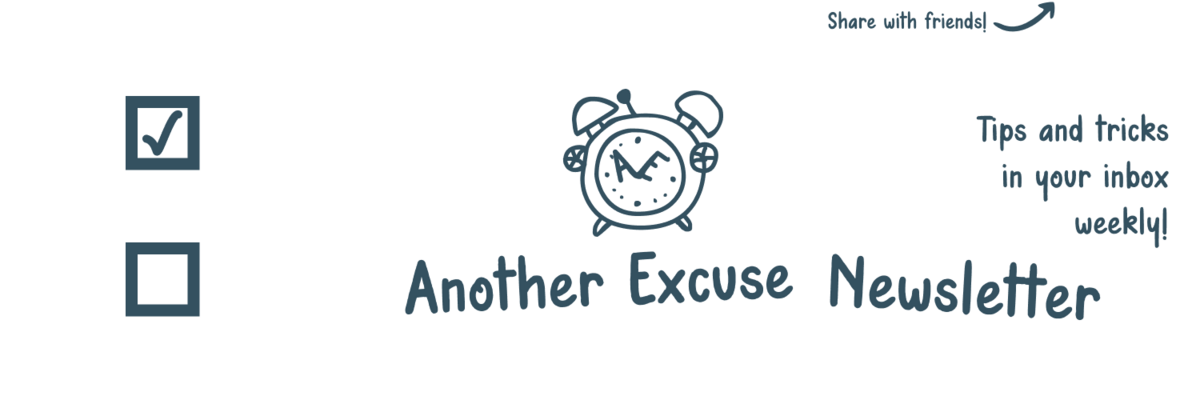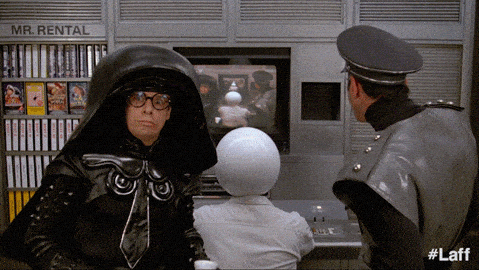- Another Excuse Newsletter
- Posts
- What's been in front of us all along?
What's been in front of us all along?
It's so obvious once pointed out to us.

Another Excuse Newsletter
Welcome back to the Another Excuse Newsletter. It isn’t just another excuse, but a reason to start that thing you’ve been putting off.
What to expect this week:
👓Perspective - Hindsight Bias
🔨 Tool - Social Media
🍿Consume - First Hire
📖Concept - Anti-mentors
Latest Podcast Episode
Today’s episode is a celebration!🥳
I started podcasting 21 episodes ago. It's been an amazing journey and I have learned a lot in the process. I couldn't recommend starting one enough and I explain why in this episode. Check it out if you want to start one yourself.
In the episode, I chat about:
• The positives of starting a podcast
• The struggles of running a podcast on your own
• The things I'd do differently
• Everything I've learned with some tips
You can check out the episode here.
Perspective

Hindsight Bias
We all fall into this trap.
But what is the trap of hindsight bias?
Hindsight bias is a psychological phenomenon where we become convinced that we’ve accurately predicted the outcome of an event after it occurs.
This causes overconfidence in our ability to predict other future events and could lead to taking unnecessary risks.
I’m sure someone close to you has used the phrase, “See, I told you that would happen,” when you know that they weren’t so confident in the outcome to begin with.
This happens all the time.
If we’re slightly unsure about an outcome, but we’ve explored it, then when it happens we tell ourselves we were correct and knew the outcome all along.
Realistically, we had no idea that it would definitely happen. But we fall into this trap.
If this happens again and again and we don’t keep ourselves in check, we can inflate our ability to predict outcomes. Which could lead to horrible results because of our blind confidence.
I hope this makes sense.
Basically, check yourself when you find yourself telling others that you knew it would happen.
Did you really?
Tool

Social Media
Social media is either an obvious fantastic tool to some or a complete distraction to others.
It’s amazing that single apps can be used for many different purposes.
I see social media as one of the best tools for two reasons.
First, you can learn anything on the internet for free these days. Not only on YouTube, but on any other social media app has amazingly informative content.
You just can’t be passive about how you consume content.
If you intentionally search, like, share, and save content that you want to learn about on any platform, it will tailor the algorithm to suit you.
Once you do a bit of work upfront, you can take the more passive typical social media approach, but be consuming informative content on topics you want to learn about and areas you want to grow in.
The second is growth.
We’ve never experienced platforms with as much reach and discoverability before.
The odds of you finding people who resonate with your ideas are high and so are the chances of opportunity.
Going viral doesn’t need to be the metric, but people coming across your work and new things happening can be.
Yes, it can be a distraction and impact mental health. But use it in the right way and your life can change for the better.
Consume (Read / Watch / Listen)

First Hire
Alex Lieberman, the founder of Morning Brew chats about your first hire on his podcast.
I love his short bite-size episodes because they’re easy to digest, and to the point, but detailed enough that I come away feeling like I’ve learned something.
The first tips he gives when hiring are:
Have a comprehensive job description
Have a detailed interview process - filter for what you needed
Meet criteria - can they do the job exceptionally well? Can we see this person starting a business after they leave here?
The hire then needs to meet 4 characteristics. Are they:
a force of nature
a critical thinker
obsessive
Self-aware
If you’d like to check out the episode, you can do so here.
Concept

Anti-mentors
We spend a lot of time looking up to people, idolizing them and even hoping that they become our mentors.
Yes, mentors can be extremely valuable, but we tend to lose sight of something equally valuable.
The anti-mentor.
There are a few versions of an anti-mentor. One is a person who intentionally leads you down the wrong path and the other is someone who shows you what not to do, based on their actions.
I want to speak about the second one today.
If we had to make every mistake and learn every lesson ourselves it would take a very long time to achieve our goals.
We learn a lot about what not to do through people we’re close to and even look up to.
It saves us a lot of time and yet we aren’t as vigilant about these lessons.
Two distinct areas we learn many of lessons are at home from our parents and at work from managers.
These are the more obvious ones and the ones we usually discuss and analyze, but they’re all around us.
Rather than complaining about their actions, reframe it in a way that you have now learned what not to do and it makes better for it.
Once I started looking for these lessons, it completely changed my framing. Almost everything becomes a lesson rather than a mishap.
It may be easier said than done, but it’s worth considering.
Thanks for Reading
Now start something!

P.S. Feedback is welcome and needed! If you’d prefer to send me an email and not respond, you can do so here: [email protected]
Check out my socials below 👇
Reply